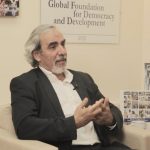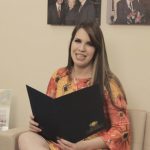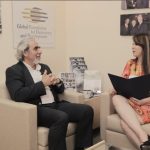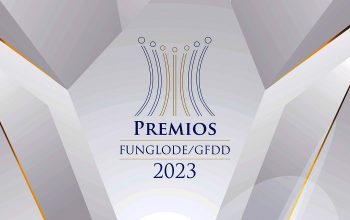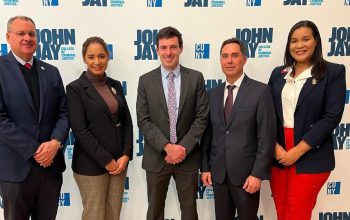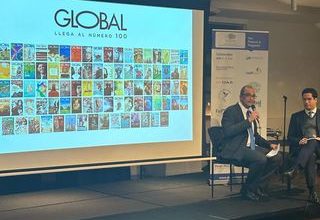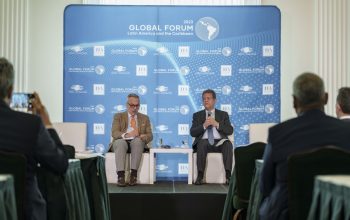news
Global Roundtable Interview with the OAS’ Luis Porto Covers Democratic and Development Challenges in the Americas
July 24, 2019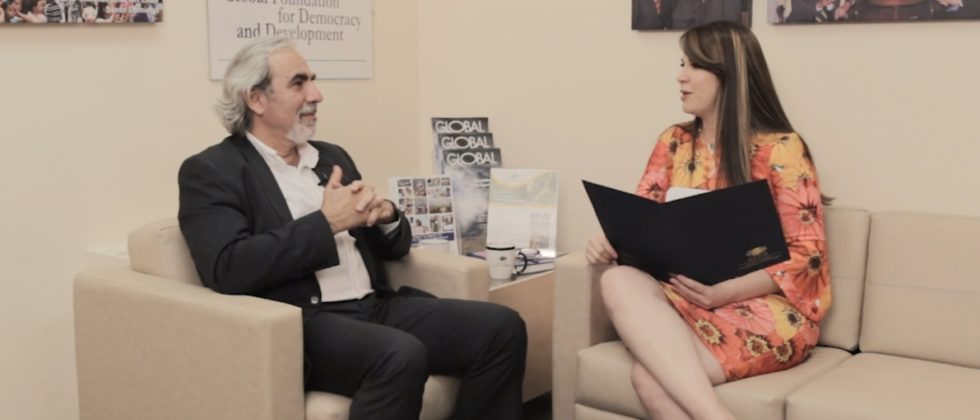
Washington, D.C. – The Global Foundation for Democracy and Development (GFDD) was pleased to welcome Senior Advisor to the Strategic Counsel for Organizational Development and Management for Results at the Organization of American States (OAS), Luis Porto, to the organization’s offices in Washington, D.C. for a Global Roundtables interview.
On July 24 diplomat and GFDD contributor Angie Martinez spoke with Porto, the former Undersecretary of Foreign Affairs in the Uruguayan government, about challenges that Latin America and the Caribbean face in terms of democracy and development.
To begin the interview, Martinez asked about Porto’s academic and private sector experience and how it prepared him for roles in government and at the OAS. Porto mentioned that one of the greatest lessons from his time in the private sector was to be results focused. He also mentioned the need to practice solid time management. The OAS Senior Advisor has often utilized this skill while working in the world of multilateral organizations, which tends to require a lot of patience, he said. Finally, during his time as a professor, Porto learned about the importance of following frameworks rather than anecdotal experience when implementing initiatives.
When asked about the meaning of the current slogan of the OAS “More rights, for more people” Porto said that it stresses the fact that specific groups in the region do not have access to certain rights while others do. “We are the most unequal hemisphere in the world” said Porto. The OAS Senior Advisor stressed the varying rights of people in the region in terms of access to quality education and justice. “More rights, for more people is a guide for the promotion of equality in the hemisphere” he concluded.
There are several great challenges for democracy in the region, according to Porto. One of those is inequality, since vulnerable groups have limited rights in comparison to the region’s rich. Another is the inability of governments to respond to the needs of their citizens. In Latin America there is great dissatisfaction with economic policies, for instance. In certain countries the poorest individuals have absolutely no connection to the government. He stressed the need to implement more “checks and balances” in such governmental systems.
Martinez also asked the OAS Senior Advisor about that regional organization’s ability to respond to the hemisphere’s toughest problems. Porto commented that, while there are several mechanisms that the OAS possesses to support democracy and development in the region, it would be helpful to strengthen those tools. The most pressing challenge for the OAS is its inability to ensure that states follow mandates or recommendations. The OAS cannot force Venezuela to comply with the Inter-American Democratic Charter, for example.
Porto spoke briefly about the OAS’ School of Governance, a tool to strengthen institutional transparency, citizen participation and government accountability. It trains public officials, as well as political, social and community leaders to support open and transparent governance in the region, he explained.
Porto finished the conversation with a discussion about his relationship with former Uruguayan President, José Mujica, with whom the OAS Senior Advisor worked as Undersecretary of Foreign Affairs. The former president is a terrific listener, politician and humanist, among many other things, said Porto. Learning to lose was one of the greatest things that the current OAS Senior Advisor gained from his time spent with President Mujica.
About the Luis Porto, Senior Advisor, Strategic Counsel for Organizational Development and Management for Results, Organization of American States (OAS)
Originally from Uruguay, Luis Porto is an economist, writer and professor. Since 2015 he has served as a Senior Advisor at the Organization of American States (OAS).
Prior to his time at the OAS, Porto served in various capacities in the Uruguayan government including Undersecretary of the Ministry of Foreign Affairs from 2013 to 2015; Undersecretary of the Ministry of Economy and Finance from 2011 to 2013 and President of the Corporación Nacional para el Desarrollo from 2010 to 2011.
Porto was a professor of Industrial Economics at the University of the Republic of Uruguay from 1994 to 2015. He has also served as a professor at various universities in Uruguay and abroad.
He has a degree in Economics from the University of the Republic and a master’s in Economics from the Catholic University of Lovaina in Belgium.
Porto is the author of numerous books and articles related to finance, economic competition, investment and productive public policy and has presented research at events and seminars in more than 20 countries in Latin America, the United States, Europe and Asia.
More information about GFDD Global Roundtables:
http://gfddglobalroundtable.org/

